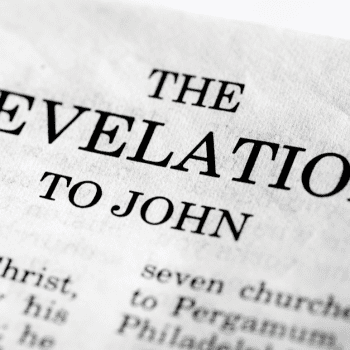Monday: Read 1 John 1:1-4
The letters from James through Jude (which include 1-3 John) are commonly referred to as the Catholic letters—meaning universal—because they are not addressed to one person or an individual community.[1] This is very much the case for 1 John.
First John is even difficult to label as a “letter” because it lacks the traditional opening and closing that we see in other NT letters. It is also uncertain as to which of the three letters of John was even written first. The order as we find them in our Bible is likely the result of their size (2 John is slightly longer in the Greek text than 3rd John). It is possible that 2 John was written first since the false teachers had not yet left the church, whereas in 1 John they had left (2:19).
In addition, it is hard to identify the author of any of the Johannine letters. First John is anonymous and in 2, 3 John the author is simply “the Elder” (1, 1). The author of 1 John does seem to indicate that he was an eyewitness of Jesus (1:1-4). In fact, because he has seen Jesus, he is certain of the message he is proclaiming (1-4).
Thus, when the letter opens with “what was from the beginning” (1), the Greek is neuter suggesting that he has in view the message that was from the beginning. Of course, this message was also something that he “looked at,” “touched,” and it was “manifested” (1-2), thus it is the person of Jesus also.
This message is “the eternal life, which was with the Father and was manifested to us” (2). John then adds that he is proclaiming what he has seen and heard “so that you too may have fellowship with us” (3).
The word for fellowship (koinonia) implies a close relationship (see Gal 2:9; Phil 1:5; 3:10; Phile :6; 1 John 1:3) or even financially helping people in need (Rom 15:26; 2 Cor 8:4; 9:13; Heb 13:16). Since this word only appears in 1:3, 6, 7, it may have not have been John’s term but that of his opponents.
For John, true fellowship is with the Father and the Son. Unfortunately, those who have forsaken the Apostle’s teaching have also forsaken the fellowship that is in the Father and Son (3).
Questions to ponder/discuss:
- Many readers of the Bible love the letters of John because of their focus on love. Indeed there is much to like about these letters. But if we read with only a positive outlook, we might be missing the context. John was likely deeply grieved as he wrote. The problem was simple, some (or perhaps “many”) were not walking in love and were teaching others to follow them.
- We need to look at this letter and ask: Are we grieved when we see disunity in the body of Christ? And are we looking at ourselves and how we may have contributed to the disunity?
- Throughout our study of the NT thus far, we have seen that there were some significant issues facing the churches in the first century. They were plagued by sin, deception, greed, lust, and a host of other sins. In addition, false teachers were prevalent. Should we then be surprised that such issues are still present today? How does this impact your understanding of the church?
- How can you make a difference?
Tuesday: Read 1 John 1:5-10
The letters focus on the centrality of Jesus’ command to love one another just as Jesus loved us. John stresses that this is not a new command but an old one (2:7). Yet, in Christ it is new (2:8).
In the first main section of the letter (1:5-3:10), John focuses on the message that “God is Light” (5; see Ps 104:2 Light is His garment; Ps 27:1 “Thy Lord is my light”; see also John 1:9; Eph 5:8-14; Rev 21:23; 22:5: note: light/darkness is a motif for good/evil; moral/immoral). For John, then, we are called to “walk in the Light as He Himself is in the light” (7). And we do this by obeying His commands (6-7; 2:9-11).
In 1:6-10, John provides three tests in the form of a false claim which is introduced by the conditional ‘if we say’ (6, 8, 10).
First, “If we say” that “we have fellowship with Him yet walk in the darkness, we lie and do not practice the Truth (6). John then responds to this claim with, “but if we walk in the Light as He Himself is in the Light, we have fellowship with one another, and the blood of Jesus His Son cleanses us from all sin” (7).
Second, “If we say” that “we have no sin, we are deceiving ourselves and the truth is not in us” (8). The Greek is helpful here for it suggests that we are claiming that we have no sin in the present. Perhaps, some were claiming this condition on the basis of their reception of the Spirit (see 4:1-3). John then responds, “But, if we confess our sins” He will forgive us and purify us (9; see Deut 32:4).
Third, “If we say” that “we have not sinned, we make Him a liar” (10). The Greek suggests that this claim is that one has never sinned. To say such is to make God a liar because the whole of Scripture testifies to our sinfulness.
Questions to ponder/discuss:
- 1 John 1:9 is a significant promise in Scripture. God is faithful. And because of this, His promises are sure. If we come to Him, we will be forgiven. This, of course, assumes that we are not bringing an empty confession but genuine repentance. Much of this letter, in fact, contends for the necessity of works (2:3-4).
- So often it seems that our prayers are spent asking God for things. Spend some time today in repentance: confessing your sins and asking for His forgiveness. Thank God for His faithfulness through which we can be assured that we have been forgiven.
- When someone says, “God cannot forgive me” they are saying more about their own belief in God than they are about God Himself. For one, they are saying that God is not big enough or good enough to forgive them. This means that their God is too little. In addition, they may be saying that they are not worthy enough. The problem here is 1) no one is worthy; 2) all are made in God’s image and are worthy of His love and forgiveness.
Wednesday: Read 1 John 2:1-17
John reminds them that they are not to sin but if they do “we have an Advocate with the Father, Jesus Christ the righteous” (2). The word “advocate” (paracletos) is used five times in the NT. The other four uses are all in the Gospel of John (14:16, 26; 15:26; 16:7). In each instance it is used by Jesus in reference to the Holy Spirit. The word generally means “one who comes alongside to help.” In 2:2, however, it retains its legal sense and it indicates, a person who intercedes on behalf of someone else. John, thus, assures them that even if we do sin (and “repent” is implied), we have Jesus who comes to our defense and speaks to the Father on our behalf!
In 2:3-6, John provides a test indicating one’s loyalty to Christ through their obedience. To say, “I know Him” is to “keep His commandments” (4). In particular, we are “to walk in the same manner as He walked” (6).
In 2:7-11, John provides an additional test: the test of love. John assures them that it is not a “new commandment” but “an old commandment” (7). In fact, this commandment is one “which you have had from the beginning” and “which you have heard” (7). John then adds, “On the other hand, I am writing a new commandment to you” (8).
How can this be? Simple: the command to love (4:21) is not new (see Deut 6:5; Lev 19:18; Matt 22:37-38; Gal 5:14; Rom 13:8-10), yet, Jesus gave this command a depth that made it new: “A new commandment I give to you, that you love one another, even as I have loved you, that you also love one another” (John 13:34). The command is to love others as Christ has loved us.
For John, if we love one another then we are “in the Light” (10). But if we hate our brothers then we are “in the darkness” (11).
John then provides encouragement to three groups (children 12, 13; fathers 13, 14; young men 13, 14) and a warning not to follow the way of the world (15-17).
We are not to “love the world” or the things in it (15) because if we do so “the love of the Father” (15) is not in us. After all, what is in the world “is not from the Father” (16). In saying this, John is not speaking of the physical cosmos versus the spiritual cosmos as has too often been preached. Instead, he is speaking of the sinful and destructive ways of the world (16). Thus, it is the “lusts” of the world that pass away while the “one who does the will of God lives forever” (17).
Questions to ponder/discuss:
- The call to discipleship is great. To “walk as Jesus did” is no small command. For John, this is what it means to follow Jesus. Of course, we will sin along the way. And when we do, Jesus is right there as an advocate.
- The call to love as Jesus loved us is far deeper than I think we realize. How many congregational meetings or elder meetings (depending on your church’s way of doing things) would be far more productive and far less hostile if everyone “walked as Jesus did” (6)? How much more would family relationships be simmered, if we walk as Jesus did? (Now I am not saying that all would be right in the world if we only followed Jesus. The reality is that sin and pride still abound. Sometimes congregational and elders’ meetings need to be contentious because the issues are serious. I am simply saying, what would be the result of these meetings if we all went in with the desire to “walk as Jesus did.”
- The next time you encounter a confrontation make it your aim to “walk as Jesus did” in the midst of it. This begins with repentance and recognizing our own faults and weaknesses, as well as being open to hearing from the Holy Spirit.
Thursday: Read 1 John 2:18-27
In 2:18-27, John turns from words of encouragement to words of warning. He begins by putting the present situation into an eschatological (end-times) context. “It is the last hour” and “many antichrists have appeared” (18).
In 2:19, John provides another test for the people of God: the test of perseverance. He notes, “They [antichrists] went out from us, but they were not really of us; for if they had been of us, they would have remained with us.”
John then attempts to provide assurance for his readers in contrast to the false teachers who have left: “But you have an anointing from the Holy One” (20, 27). By “anointing” John certainly has the Holy Spirit in mind (see John 14:17; 15:26; 16:13).
John’s assurance is wrapped in the fact that they confess in Jesus and in doing so they have the Father also (24). This passage makes the most sense in light of a high Christology (understanding of Jesus) and what came to be formulated as the doctrine of the Trinity (that the three persons of the Father, Son, and Holy Spirit are all divine and yet God is one). Thus, to confess in Jesus as the Son is to confess in the Father.
John’s other concern is that his readers are not deceived (26). When he says that “you have no need for anyone to teach you’ (27), he means that they have no need to be taught differently because the Spirit is leading them in accord with what they have been taught by John.[2]
Questions to ponder/discuss:
- John is the only author to use the word “antichrist” (see 2:18*, 22; 4:3; 2 John 7), and his usage seems to go against many of the popular conceptions of the antichrist. Read 1 John 2:18, 22; 4:3; and 2 John 7: What does John tell us about “antichrist” (do your best not to read into the passage something you may know—or think you know—from other passages)? That is, only answer the question based on what John says.
- Based on what John says where should we be looking to find an/the “antichrist”?
- John’s concern was for his readers. They have an anointing! Note, in Greek, 2:20 begins with “and”: “they were not of us (19)—evidenced by their going—and you have an anointing.” Though we might want to get into theological debates at this point, it is best to focus on John’s concern which was to provide his readers with an assurance based on the presence of the Spirit in their lives.
- Do you think that John meant that they could sit back and rest assured of their faith without any responsibility to do good works? Base your response on something John says.
Friday: Read 1 John 2:28-3:24
For John, there are two families. There are the children of God who do what the Father does: namely “righteousness” (2:28; 3:7) and “love” (3:1, 11). And there are the children of the devil who practice sin (3:8).
For John, the difference between the two families is exemplified in their acts of love or hate. We must be careful not to impose modern conceptions of love as an emotion. For John, love is much more concrete. Thus, “We know love by this, that He laid down His life for us” (3:16). For John, love was sacrificial. Love looks like the Cross!
John says that our call is to follow Jesus’ example of love: “we ought to lay down our lives for the brethren” (3:16). In fact, for John, this is the basis of our assurance that we are children of God: “We know that we have passed out of death into life, because we love the brethren” (3:14).
Finally, for John, loving our neighbor is tangible: “But whoever has the world’s goods, and sees his brother in need and closes his heart against him, how does the love of God abide in him” (3:17).
Questions to ponder/discuss:
- In 3:2, John says that “when He appears, we will be like Him.” Such a statement looks forward to our eternal nature when we will fulfill what it means to be made in God’s image (Gen 1:26-27). Since Jesus is the Image of God (Col 1:15), for us to reflect God’s image is to become like Jesus!
- It is important to note that being like Jesus is not simply something that we will become (although that is true). It also relates to what we are to do in the present. God’s people do what God does.
- Looking through this passage, what are some of the characteristics of the children of God?
- When John says that “No one who abides in Him sins” (3:6), he is indicating a life of consistent and habitual sin. This is supported by the Greek but also by the fact that John has already said, ‘If we say that we have no sin, we are deceiving ourselves and the truth is not in us” (1:8).
[1] Though 2 John and 3 John may be exceptions to this.
[2] To argue that this verse says we should only be led by the Spirit and not by any teachers fails to recognize the inherent inconsistency of this statement. That is, in the verse itself, John is teaching them that they do not need to be taught: self-refuting.














